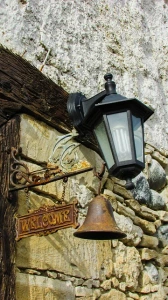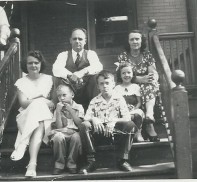Where Among Dreams She Had Often Walked
 Small and delicate, fair as a flower,
Small and delicate, fair as a flower,
A woman on this earth who
At thirty-seven of her years passed
Away. Since her absence from the visible
World she has lived in many of my memories.
She died too soon to be aware of much of
My life, and I will not be able
To tell her about it, nor she to share her
Thoughts of what her life might
Have been had she grown old where
It ended: in beauty far across the pitching
Blue sea, along rows of white-sand beaches
Where among dreams she had often walked.
Chicago’s El Trains
At eight years–
My place of birth.
Walking through
The viaduct
Under the el platform
And into and out of
The cool, spread shadows
Amidst the thunderous
Rattle of the trains
Overhead that make
The earth and my heart
Tremble
The Welcome Inn
 We enter that tumult of sweat and whiskey, amidst the
We enter that tumult of sweat and whiskey, amidst the
Glow of the red bar lights and clouds of floating smoke
And stand next to a tattooed woman snapping a
Bull whip and wearing a black satin cape with red lining
And see a man pull a pistol on another man. The
Second man snatches the gun from the first and
Slugs him over the head. He turns to us
Disgusted with his friend, supine on the floor, and says
“He’s always doing that,” and that is the end of that.
What Are We To Do?
What’s the use trying to say what I feel?
How does it happen? How is it concluded
That this person should be happy, that one not?
This one healthy; that one ill; one blessed, the other
Troubled; he–undeserving– to live a long
And happy life; she who in her life has hurt
No one to die before she has fully lived?
How is it decided that this one should be put
Together with that one and that they should
Love each other all their days, but that another
Shall despair in loneliness. What happens to us
That we become the people we are, and
What are we to do now?
Judy Wazorick
We were in grammar school together.
She had a blue eye and a brown
And sat in the last seat of the last row.
She was very shy, but when I looked at her
She smiled at me.
Now I see she won’t be at the reunion,
And I am so sad because Judy Wazorick
 Has passed away.
Has passed away.
Butterflies, Flowers, and Lovers
Butterflies, you and I,
Fluttering over gardens–
Our little world–
From flower to flower
In search of that one who is to us,
Though perhaps to no one else,
The loveliest flower,
And when we find that lovely flower,
Then we are content forever.
The Girl in Greenwich Village
I saw you
Looking at me
Knowing I had
Looked at you,
No chance ever
To see you again
Or you to
Look at me again
With your dark eyes,
You who had I
Known long ago
I would have run
My finger over
So carefully
And held
In my hand
Like an orchid.
Awaiting the Arrival of Dawn
 I delight in darkness and know that a bond
I delight in darkness and know that a bond
Intertwines me with everyone who exists
Or ever has, or will; and know too that some
Yet unknown purpose to my life beckons fondly
And that one day I will discover it.
So I dream of splendid things through
Each day as my life flickers away.
I welcome the luminous skies above and the
Magnificence of morning–and I will all
My life while awaiting the arrival of dawn.
A Man Like Every Other
I thought as all children think of their fathers
At that age that he was a great man. He had
Made a life out of little accomplishments that
Were magnificent to me–had made a paper
Weight, had painted a wagon, could change a tire.
Then he felt he had done something, and so did I,
A man who would live in anonymity, do the best he
Could, be remembered a little while
And forgotten. A man like every other.
Lightly Falling Snow
In the mountains, near the snow line, a blue
Haze is draped in grandeur over the land,
The summits surrounding us stupendous
.We have a snowball fight and then lie exhausted
And breathing hard in the snow while laughing
And making angels with our arms and legs.
We then come to an inn set far back from the road
Across a gravelly parking lot surrounded by tall trees
That are black with rain that fell last night.
We go up the long wooden stairway to a landing
With roughly-hewn wooden tables and chairs. But it is
Too cold to sit outside and so we go in.
The dining room is empty but for a waiter leaning
Against a wall. The tables are set with white linen
And gold utensils, and dressed as we are we seem
Out of place. We sit at a table by a wide window with
A good view of the mountains. The waiter comes over and
We order coffee.
From the window, Nick, the waiter,
 And I watch a lightly falling snow.
And I watch a lightly falling snow.
Bedtime Prayer of a Little Boy
Of my family I thought in my child’s way–
They were all of them–each of them–good people, devoid of malice,
And I was blessed to be among them. Why, I wonder, had I been so
Favored. I thought, “Dear Lord, keep us safe, and please treat us kindly.
Spare us please from suffering or so apportion it so that none of us is asked
To bear more than one should be required to.” I prayed, as always fast,
“God bless Mom and Dad and…” and I fell asleep beseeching God.
The day ended then, and I dreamed and in a moment another dawn broke.
Hobos in a Clearing
We reach the crest of the hill at dusk.
Below us, like the camps of infantry,
Burn the scattered fires of forgotten men,
Each a separate picture.
They live in the open or in
The opulence of tarpaper lean-tos against a tree,
And migrate as punctually as geese.
They wear black–perhaps it is the soot of freight trains–
And squat on their haunches like crickets
Beside the snapping flames.
Streams of smoke trail off high into the trees
And embers flicker and fade, flicker and fade
In the harsh bite and sparkle of the wind,
And glow bronze on the men’s untroubled faces
Late into the night.
Ice Cream Man
A bevy of children
Proffering handfuls
Of nickels and dimes
To the wizened Ice Cream
Man in exchange for
A bar thickly crusted with
Brittle dark chocolate
Or nuts, or both
LONGER NARRATIVE POEMS
Lyric for Angela
At seventy-five cents per hour
I am a twelve year old
Professional bagger of cans
Of pineapples and tomatoes,
Weigher of potatoes,
Stocker of shelves
So the labels artfully frame
For the customers’ eyes
The Gerber baby,
The Scott tissues,
The orange carrots,
The vivid green peas.
When I am near Angela,
The dark-eyed store owner
Who favors me
My heart beats faster.
I cannot breathe
When I am near Angela.
As she works she sings.
Her spirit enfolds and singes me
As with molten tongs.
She smiles with
Such sweetness, gentleness,
And goodness it breaks my heart.
Her hair, her voice, her hands, her
Presence bring
A quality into my life
Which I know to be love.
My youth is purer,
My memories more
Lasting because of her.
Angela’s husband is awful
To her and treats
Her cruelly.
I vow that one day I will
Whisper to Angela,
“Why don’t you run away?”
But I fear she will not
And that after I have gone
To high school and college
And am grown up
She will still be heard
Singing in the aisles
Of this little store
Like a bird in her cage.
A Wagon, an Old Man, and Old Horse
(A Scene from Edgewater, Chicago, 1949)
Keeping to no particular schedule other than
It be daylight nearing evening, from down the alley
Through sunlight and shade, always from the west,
Never the east, comes the old disheveled
Rag Man–appearing to be a rag himself.
He sits high atop a large horse-drawn, creaking wagon
Loaded with junk, his gruff, metallic voice preceding
Him by half a city block: “Rags, old iron.”
As the wagon nears, I hear, faintly at first, and then
More clearly, more purely, more emphatically, the
Mellow clomp, clomp, clomp of the shod hooves
Of the old brown mare whose head hangs low, neck bowed,
And swaying slowly to the rhythm of her gait. She elevates
Her head as high, as majestically, as a queen of horses
Who is a about to speak and shakes her harness
Chains musically but uncomfortably and opens wide her mouth
To gulp the air. Then I hear her snorts as she struggles
Futilely with her bit and notice her bulbous brown eyes
Glazed with an expression of weariness and sorrow,
And the sunlight glistening off the thick sheet of sweat coating
Her flanks and the sinewy twitching muscles of her legs.
The sounds of hooves grow soft, then softer, and vanish,
Not to be heard again until another afternoon I witness the
Elegant procession of a wagon, a man, and a horse, and
Hear a voice bellowing, “Rags, old iron.”
On A Beach on a Wind-Blown Day
 So there it is, laid out in my mind: that moment in our lives,
So there it is, laid out in my mind: that moment in our lives,
That day in July. We are told that memories recede, grow fainter,
Fall to tatters, but I remember that afternoon that
Has persisted through all the successive years, recalling it
Just as I lived it. Though it is intangible and lies in memory alone,
Nothing else is as real; everything vanishes in comparison.
It is with me when I bend to tie my shoelace, or ask for a fork. Or
Fall asleep: my sister on the beach gripping my hand not to be
Swept away by the swirling, angry wind, and she standing on her
Tip-toes on a little stool down the aisle in the stacks at the dusty library,
Reaching for Little Women; my realizing in that instant, watching her,
That she was irreplaceable; I couldn’t do without her. So with her
In front of me on her red bike, I on my blue English racer, the two
Of us hurtled down Chicago streets at dusk. Her black hair flowing,
We raced–a glorious day when we were young.
Nurse’s Goodbye to Her Patient
I saw my sister’s favorite nurse up ahead
In the parking lot and called her name and she stopped
And turned around and I ran and caught up with her.
I expressed my gratitude to her for the gentleness
She had shown my sister. I told her I would never forget
Her kindness and thoughtfulness, and that I
Would remember her all my life, as I have.
She told me
What a good patient Sharon was, how despite her suffering
Sharon had never complained and was always so nice and
Had good manners, and how it would make her very sad
When she would have to say goodbye to her.
That night I left for home.
© 2024 David J. Rogers
For my interview from the international teleconference with Ben Dean about Fighting to Win, click the following link:
Order Fighting to Win: Samurai Techniques for Your Work and Life eBook by David J. Rogers
or
Order Waging Business Warfare: Lessons From the Military Masters in Achieving Competitive Superiority
or



 I will arrive in the evening as the sun
I will arrive in the evening as the sun Working so hard on abstract
Working so hard on abstract The gaudy, intermittently-flashing lights of the vacancy
The gaudy, intermittently-flashing lights of the vacancy Think of the last time you were discouraged. You were knocked off balance and became weakened and vulnerable. Possibly something you longed to happen did not happen, or something you dreaded happening did happen. Then you were discouraged. Courage is a thing of the heart. The word “courage” derives from couer,” the French for heart. To be “dis” couraged is to lose heart. You were never too young and will never be too old be to be discouraged. You don’t outgrow discouragement.
Think of the last time you were discouraged. You were knocked off balance and became weakened and vulnerable. Possibly something you longed to happen did not happen, or something you dreaded happening did happen. Then you were discouraged. Courage is a thing of the heart. The word “courage” derives from couer,” the French for heart. To be “dis” couraged is to lose heart. You were never too young and will never be too old be to be discouraged. You don’t outgrow discouragement. Action is the most effective antidote to discouragement To rid yourself of being discouraged strive to be a person of action. The happiest and most courageous people in the world have a preference for action. Rarely are they discouraged. They are too busy to be. In high spirits they persist through difficulties, overcoming setbacks, resisting gloomy moods, never losing hope. That is why they are so happy. The samurai of ancient Japan were the most action-obsessed men and women who ever lived.
Action is the most effective antidote to discouragement To rid yourself of being discouraged strive to be a person of action. The happiest and most courageous people in the world have a preference for action. Rarely are they discouraged. They are too busy to be. In high spirits they persist through difficulties, overcoming setbacks, resisting gloomy moods, never losing hope. That is why they are so happy. The samurai of ancient Japan were the most action-obsessed men and women who ever lived. peace. So I began to search for solace and wisdom.
peace. So I began to search for solace and wisdom. I chose as the basis of the book the spiritual insights of samurai warriors of ancient Japan. It may seem that the psychology of people like that who lived four centuries ago in a foreign country would have little to say to you, yet if you are interested in ways to strengthen yourself spiritually, that is the place and era to look for information. Samurai had introduced the teachings of Zen into the Japanese culture. Zen was “the religion of the samurai.” Many samurai were poets.
I chose as the basis of the book the spiritual insights of samurai warriors of ancient Japan. It may seem that the psychology of people like that who lived four centuries ago in a foreign country would have little to say to you, yet if you are interested in ways to strengthen yourself spiritually, that is the place and era to look for information. Samurai had introduced the teachings of Zen into the Japanese culture. Zen was “the religion of the samurai.” Many samurai were poets. Samurai were models of action-oriented people. The essential feature of the samurai “Way” (way of life) is action. (That a discipline is a Way is indicated by the suffix “do.” The samurai Way is “bushido). All samurai spiritual insights and training were designed for one reason: to equip the person (a samurai or you) to make up their mind quickly and firmly and to go into action
Samurai were models of action-oriented people. The essential feature of the samurai “Way” (way of life) is action. (That a discipline is a Way is indicated by the suffix “do.” The samurai Way is “bushido). All samurai spiritual insights and training were designed for one reason: to equip the person (a samurai or you) to make up their mind quickly and firmly and to go into action 
 Every day’s goal of healthy people is to be happy, to love and be loved, and not to be discouraged. But there are many impediments–opponents. In the arts among artists and writers I know so well, and in everyday work and personal life, like a samurai in battle, everyone encounters those opponents. Some are outer opponents–an outrageous person who’s hard to get along with (a harsh critic of your writing or painting, for example if you are in the arts), personal crises, setbacks, failures, Etc. People who steal from you.
Every day’s goal of healthy people is to be happy, to love and be loved, and not to be discouraged. But there are many impediments–opponents. In the arts among artists and writers I know so well, and in everyday work and personal life, like a samurai in battle, everyone encounters those opponents. Some are outer opponents–an outrageous person who’s hard to get along with (a harsh critic of your writing or painting, for example if you are in the arts), personal crises, setbacks, failures, Etc. People who steal from you. All samurai training was designed to overcome those dragons so that in your everyday life you will progress smoothly from experience to experience, challenge to challenge, achievement to achievement, happiness to happiness.
All samurai training was designed to overcome those dragons so that in your everyday life you will progress smoothly from experience to experience, challenge to challenge, achievement to achievement, happiness to happiness. Acquiring wisdom from the samurai Way suits people who wish to overcome discouragement and are able to make use of insights and techniques from any era or culture that will help them. What strikes me is the ease with which readers of the book adapt those insights from centuries ago to their current everyday living.
Acquiring wisdom from the samurai Way suits people who wish to overcome discouragement and are able to make use of insights and techniques from any era or culture that will help them. What strikes me is the ease with which readers of the book adapt those insights from centuries ago to their current everyday living. Highland Park is not a big place at all. It is an idyllic little Midwestern American city of about thirty thousand–clean and peaceful, and until the Fourth, safe. Clustered together at its center are a railroad station, City Hall, public library, and on the library lawn a long chromium sculpture no one understands. It is a community that values the arts: more writers live here than in any other community between Chicago to the south and Milwaukee to the north. Double screen writing Academy Award winner William Goldman was from Highland Park. Actor/movie director Orson Welles lived here in his adolescence and sat on his lawn reading Shakespeare; Frank Baum would take the train up from Oak Park to meet with his Oz books illustrator who lived here; the high school theatre program is renowned. Also, Michael Jordan lived here when he was leading the Chicago Bulls to championships. I’d see him at the Post Office waiting in line just like everyone else. There is no standing on ceremony in Highland Park.
Highland Park is not a big place at all. It is an idyllic little Midwestern American city of about thirty thousand–clean and peaceful, and until the Fourth, safe. Clustered together at its center are a railroad station, City Hall, public library, and on the library lawn a long chromium sculpture no one understands. It is a community that values the arts: more writers live here than in any other community between Chicago to the south and Milwaukee to the north. Double screen writing Academy Award winner William Goldman was from Highland Park. Actor/movie director Orson Welles lived here in his adolescence and sat on his lawn reading Shakespeare; Frank Baum would take the train up from Oak Park to meet with his Oz books illustrator who lived here; the high school theatre program is renowned. Also, Michael Jordan lived here when he was leading the Chicago Bulls to championships. I’d see him at the Post Office waiting in line just like everyone else. There is no standing on ceremony in Highland Park.
 have finished a painting that in your judgment is excellent in every respect. Like Ariel you are trained and educated in your craft and recognize your paintings’ consistently high quality and dazzling originality. You know you can’t do better. You feel that no one but you could have executed this project. It required blending many abilities not every painter possesses. You see in your painting, as Ariel saw in hers, something especially flamboyant and fetching. Your hopes for its artistic and financial success are high.
have finished a painting that in your judgment is excellent in every respect. Like Ariel you are trained and educated in your craft and recognize your paintings’ consistently high quality and dazzling originality. You know you can’t do better. You feel that no one but you could have executed this project. It required blending many abilities not every painter possesses. You see in your painting, as Ariel saw in hers, something especially flamboyant and fetching. Your hopes for its artistic and financial success are high. your book. She recognizes its significant sales potential. She calls you In Chicago from New York and says that your book is one of the two or three best books of any type she has ever read. She is entranced with the book and pledges to you to commit to “putting it over” whatever resources are necessary to make it the country’s top best seller (The book is topical and has that kind of potential.) You call your agent and ask him about the publisher reputation and he tells you that they are known for selecting one of their titles each year and making it the kind of best seller the publisher described.
your book. She recognizes its significant sales potential. She calls you In Chicago from New York and says that your book is one of the two or three best books of any type she has ever read. She is entranced with the book and pledges to you to commit to “putting it over” whatever resources are necessary to make it the country’s top best seller (The book is topical and has that kind of potential.) You call your agent and ask him about the publisher reputation and he tells you that they are known for selecting one of their titles each year and making it the kind of best seller the publisher described. resilient means first of all accepting such adversities and those you have experienced yourself as an unavoidable part of the writer’s and artist’s life. That insight deeply-felt and never forgotten is essential for maintaining a firm, unshakeable spirit.
resilient means first of all accepting such adversities and those you have experienced yourself as an unavoidable part of the writer’s and artist’s life. That insight deeply-felt and never forgotten is essential for maintaining a firm, unshakeable spirit. period the body-builder rests, those muscles are rebuilt, but bigger and stronger than they had been. Don’t be so afraid of hardships, stresses, difficulties, and crises. They strengthen you emotionally, spiritually, and mentally.
period the body-builder rests, those muscles are rebuilt, but bigger and stronger than they had been. Don’t be so afraid of hardships, stresses, difficulties, and crises. They strengthen you emotionally, spiritually, and mentally. working, as confident as van Gogh and became one of the most popular American writers of his era. Ernest Hemingway said that at the beginning of his career every day “the rejected manuscripts would come through the slot in the door…I’d sit at that old wooden table and read one of those cold slips that had been attached to a story I had loved and worked on very hard and believed in, and I couldn’t help crying.” But he had faith that eventually his work would be in demand and never stopped working. The crowning achievement was the Nobel Prize in Literature.
working, as confident as van Gogh and became one of the most popular American writers of his era. Ernest Hemingway said that at the beginning of his career every day “the rejected manuscripts would come through the slot in the door…I’d sit at that old wooden table and read one of those cold slips that had been attached to a story I had loved and worked on very hard and believed in, and I couldn’t help crying.” But he had faith that eventually his work would be in demand and never stopped working. The crowning achievement was the Nobel Prize in Literature. Vincent van Gogh spent a short, intense five-year career producing an astonishing three thousand masterpieces that are now auctioned for many millions of dollars, but in his lifetime sold only one painting, and that was for a few brushes and paints. But he continued working confidently and never doubted that in the future his talents would be recognized
Vincent van Gogh spent a short, intense five-year career producing an astonishing three thousand masterpieces that are now auctioned for many millions of dollars, but in his lifetime sold only one painting, and that was for a few brushes and paints. But he continued working confidently and never doubted that in the future his talents would be recognized In every era, in creative after creative, three empowering qualities like three ingredients of a potent formula have proven to help writers and artists not to give up when they fail. Those qualities are being resilient, being persistent, and having faith in yourself. Resilient, persistent writers and artists with strong faith in themselves never give up.
In every era, in creative after creative, three empowering qualities like three ingredients of a potent formula have proven to help writers and artists not to give up when they fail. Those qualities are being resilient, being persistent, and having faith in yourself. Resilient, persistent writers and artists with strong faith in themselves never give up. Faith in yourself touches every facet of your being–whether you think about your prospects positively or in a self-defeating way, how strongly you motivate yourself, your susceptibility to self-doubt and discouragement, and the positive changes you will be able to make in your life.
Faith in yourself touches every facet of your being–whether you think about your prospects positively or in a self-defeating way, how strongly you motivate yourself, your susceptibility to self-doubt and discouragement, and the positive changes you will be able to make in your life. successful. Catherine Cox studied greatness and disagreed. She found that persistence is a key. Persistence is so important in almost every endeavor that it compensates for lesser intelligence. Cox concluded: “High but not the highest intelligence, combined with the greatest degree of persistence will achieve greater eminence than the highest degree of intelligence with somewhat less persistence. “
successful. Catherine Cox studied greatness and disagreed. She found that persistence is a key. Persistence is so important in almost every endeavor that it compensates for lesser intelligence. Cox concluded: “High but not the highest intelligence, combined with the greatest degree of persistence will achieve greater eminence than the highest degree of intelligence with somewhat less persistence. “ The breathtaking Hawaiian Islands are an inappropriate place to become ill, but Honolulu, their state capital, largest city, and principal port, is where my younger sister Sharon had chosen to live–where the last months of her life she was hospitalized. In her early twenties she had left Chicago where we had grown up and I still live and she had visited one exquisite picture post card place after another in Spain, France, the South Pacific, and the Mediterranean, and so on, in search of the single place where she thought she would be happiest living and had found it.
The breathtaking Hawaiian Islands are an inappropriate place to become ill, but Honolulu, their state capital, largest city, and principal port, is where my younger sister Sharon had chosen to live–where the last months of her life she was hospitalized. In her early twenties she had left Chicago where we had grown up and I still live and she had visited one exquisite picture post card place after another in Spain, France, the South Pacific, and the Mediterranean, and so on, in search of the single place where she thought she would be happiest living and had found it. On the nights of my visit after seeing her I would walk on the beaches, reflecting on the day, finding restful the fresh air and coolness, and sleeping at Sharon and Ron’s apartment. On the kitchen floor there was a scale to measure the dwindling of my sister’s existence, and sheets of paper on a clipboard suspended from a nail on the wall that recorded her declining weight: ninety-eight pounds, ninety, eighty-eight…and a calendar that had Xs on days she wasn’t healthy enough to work that in recent months had become all Xs. Against a wall there was a full-length gold-framed mirror that in the past she had looked into. The mirror was dusty.
On the nights of my visit after seeing her I would walk on the beaches, reflecting on the day, finding restful the fresh air and coolness, and sleeping at Sharon and Ron’s apartment. On the kitchen floor there was a scale to measure the dwindling of my sister’s existence, and sheets of paper on a clipboard suspended from a nail on the wall that recorded her declining weight: ninety-eight pounds, ninety, eighty-eight…and a calendar that had Xs on days she wasn’t healthy enough to work that in recent months had become all Xs. Against a wall there was a full-length gold-framed mirror that in the past she had looked into. The mirror was dusty. There was no need for Kathy and me to discuss where Sharon stood. It needn’t be said that it wouldn’t be long and that soon Sharon would be gone entirely from my life and from the world. I knew that the moment coming from the airport and entering her hospital room and putting down my bag when I saw with a shock how puny Sharon looked now. The illness had given her an old woman’s body that had been ravaged by suffering there in that bed that was now her final home–so skinny–all bones–very sick–dying. The pain had turned her black hair white and it was short from the treatment and no longer long. Her once-pretty face was gaunt, her cheeks gray, her body very tired. Her long pianist’s fingers were so thin that her ring had slipped off and was lost. But there in her gray, lonely, fading beauty there was still about her that same gentleness you could ruffle with your breath, the same spirit in her fierce eyes, the same poise, and the same elegance. Looking into my eyes, imagining what I was seeing, Sharon had clutched her gown across her chest in embarrassment –covering herself in shame–still a modest woman–and said, breaking my heart, sucking the breath out of my lungs, “I’m a mess aren’t I?,” and I had replied to her, “Shar, you are beautiful.”
There was no need for Kathy and me to discuss where Sharon stood. It needn’t be said that it wouldn’t be long and that soon Sharon would be gone entirely from my life and from the world. I knew that the moment coming from the airport and entering her hospital room and putting down my bag when I saw with a shock how puny Sharon looked now. The illness had given her an old woman’s body that had been ravaged by suffering there in that bed that was now her final home–so skinny–all bones–very sick–dying. The pain had turned her black hair white and it was short from the treatment and no longer long. Her once-pretty face was gaunt, her cheeks gray, her body very tired. Her long pianist’s fingers were so thin that her ring had slipped off and was lost. But there in her gray, lonely, fading beauty there was still about her that same gentleness you could ruffle with your breath, the same spirit in her fierce eyes, the same poise, and the same elegance. Looking into my eyes, imagining what I was seeing, Sharon had clutched her gown across her chest in embarrassment –covering herself in shame–still a modest woman–and said, breaking my heart, sucking the breath out of my lungs, “I’m a mess aren’t I?,” and I had replied to her, “Shar, you are beautiful.” the happy girl and boy that we had once been, getting ready to ride our bikes to the library. The gray interior lights were dimmed low, as if the plane itself were drowsy. Everything was silent but for the deep hum of the engines, the other passengers asleep. I wanted to prepare myself for what it would be like now without a sister, my parents without a daughter, my children without an aunt.
the happy girl and boy that we had once been, getting ready to ride our bikes to the library. The gray interior lights were dimmed low, as if the plane itself were drowsy. Everything was silent but for the deep hum of the engines, the other passengers asleep. I wanted to prepare myself for what it would be like now without a sister, my parents without a daughter, my children without an aunt.











